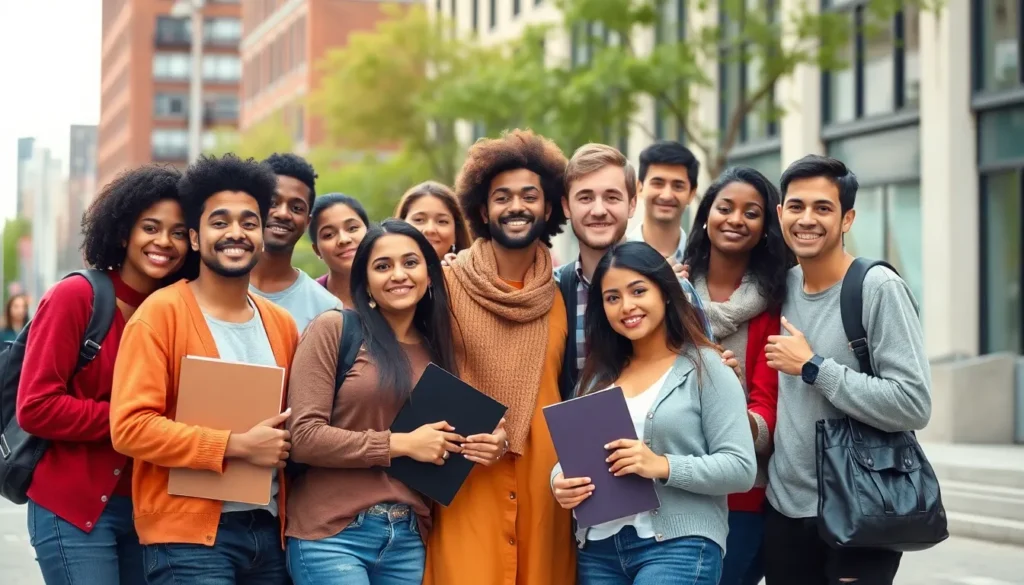Table of Contents
ToggleDreamers, unite! The question of whether DACA recipients can become citizens is more than just a hot topic; it’s a rollercoaster of emotions, legal twists, and maybe a few too many cups of coffee. With the uncertainty surrounding immigration policies, many wonder if those protected under DACA can trade in their temporary status for the golden ticket of citizenship.
While the road to citizenship might feel like a marathon with a few hurdles, it’s essential to understand the possibilities that lie ahead. The journey is filled with hope, determination, and a dash of humor as Dreamers navigate the complexities of immigration law. So, buckle up and get ready to explore the ins and outs of this important issue. After all, who wouldn’t want to turn their DACA dreams into a reality?
Overview of DACA
DACA, or Deferred Action for Childhood Arrivals, offers temporary relief from deportation for eligible undocumented immigrants brought to the U.S. as children. Established in 2012, this program allows recipients to apply for work permits and obtain a reprieve from the constant threat of removal.
Eligibility for DACA includes specific criteria. Recipients must have arrived in the U.S. before the age of 16 and lived continuously in the country since June 15, 2007. Additionally, they must currently be in school, have graduated from high school, or hold a GED, along with not having a criminal record involving felonies or significant misdemeanors.
Despite its benefits, DACA doesn’t provide a path to permanent residency or citizenship. The policy allows recipients to remain in the U.S. temporarily but doesn’t confer legal immigration status. Regrettably, the program often faces legal challenges and political scrutiny, creating instability and uncertainty for its beneficiaries.
Advocates for DACA recipients emphasize the importance of immigration reform. Many supporters argue for a more permanent solution that grants citizenship to Dreamers. Several pathways could potentially lead to citizenship, including legislative updates, comprehensive immigration reform, or the introduction of new policies that recognize the contributions of DACA recipients to the U.S. economy and society.
Navigating this complex legal landscape remains challenging. DACA recipients often face a myriad of hurdles in their quest for stability and recognition. Those who wish to pursue citizenship must continuously stay informed of policy changes and seek legal assistance to explore available options.
Eligibility Criteria for DACA Recipients

DACA recipients face specific criteria when considering paths to citizenship. Understanding these requirements helps clarify their journey.
Employment and Education Requirements
Employment and education play crucial roles in the eligibility of DACA recipients. To maintain DACA status, recipients must show proof of employment or enrollment in school. They often must work at least part-time or pursue educational opportunities. Various educational programs, including high school diplomas or GED equivalents, qualify for consideration. Demonstrating consistent participation helps establish commitment to contributing positively to society. Engaging in community service also strengthens eligibility prospects.
Continuous Residency Requirements
Continuous residency serves as another essential criterion for DACA recipients. Generally, individuals must have resided in the U.S. since their arrival, which typically occurs before age 16. Maintaining continuous residency is vital, as gaps can affect eligibility. Recipients should not leave the country for extended periods without documented permission, as this may disrupt their status. Legal recommendations often advise keeping thorough records of residence that substantiate their claims. Adhering to these residency requirements can support their eventual pursuit of citizenship.
Pathway to Citizenship
DACA recipients face several challenges on their journey to citizenship. Understanding the legal options and the influence of immigration policy helps clarify potential pathways.
Legal Options Available for DACA Recipients
DACA recipients can explore multiple legal avenues for achieving citizenship. Notably, they may pursue family-sponsored immigration if a close relative holds U.S. citizenship. Furthermore, employment-based immigration presents another viable path for individuals with job offers from U.S. employers. Certain cases might be eligible for asylum or other humanitarian protections, providing additional opportunities. Each option requires meeting specific criteria that could include continuous residency and proof of good moral character.
The Role of Immigration Policy
Immigration policy plays a substantial role in determining pathways for DACA recipients. Legislative changes directly impact opportunities for transitioning from DACA to permanent residency. Proposals for comprehensive immigration reform often include provisions aimed at offering a route to citizenship for Dreamers. Political support varies, affecting the likelihood of successful reforms. Uncertainty surrounding legal interpretations adds complexity to the situation. Continuous advocacy remains essential in pushing for changes that specifically benefit DACA recipients seeking stability and citizenship.
Challenges Faced by DACA Recipients
DACA recipients encounter numerous challenges that complicate their journey toward citizenship.
Legal and Legislative Hurdles
Legal and legislative hurdles pose significant barriers for DACA recipients. Uncertainty in immigration policies creates a climate of fear and instability. Ongoing litigation affects the DACA program’s future, leaving recipients unsure about their status. Recipients often face complex legal processes when exploring pathways to citizenship. They need to navigate family-sponsored petitions or employment-based immigration options, each with stringent requirements. Legislative changes can alter prospects for many, emphasizing the urgency of reform. Legal representation becomes crucial, yet accessing quality legal counsel can prove difficult.
Social and Economic Barriers
Social and economic barriers hinder DACA recipients in achieving citizenship. Many struggle with limited access to financial resources, affecting their ability to pursue education and professional opportunities. Discrimination can manifest in the workplace, impacting job security and advancement. Relationships with peers and potential employers might suffer due to a lack of understanding about DACA. Additionally, mental health challenges arise from the stress of uncertain futures. Community support systems often provide essential resources but may not be available to all. Building a network of advocates becomes vital for DACA recipients navigating these challenges.
Future Prospects for DACA Recipients
DACA recipients may explore limited pathways toward citizenship, despite the program’s temporary nature. Employment and educational stability significantly influence their chances. Proof of continuous U.S. residency since childhood is critical in the application process. Extended absences from the country could disrupt their status, leaving them vulnerable.
Family-sponsored immigration serves as one option for Dreamers. Individuals with U.S. citizen relatives can pursue adjustment of status. Employment-based immigration also offers a possibility, provided recipients secure job offers from qualifying employers. Alternative avenues involve asylum or humanitarian protections, but these require stringent criteria such as demonstrating credible fear of persecution.
Political dynamics shape the landscape for DACA recipients. Congressional action directly impacts potential legal pathways for citizenship. Advocacy groups continue to push for comprehensive immigration reform, emphasizing the urgency for lasting solutions.
Challenges abound for DACA recipients as they navigate potential pathways. Economic barriers, such as limited access to financial resources, present hurdles. Discrimination in the workplace further complicates their situation. Networking with community support systems plays a crucial role in overcoming these obstacles.
Litigation continues to threaten the future of the DACA program, creating uncertainty for recipients. Legal battles over the program’s status affect Dreamers’ ability to pursue citizenship. Hope remains strong among this community, supported by advocates who share their perseverance and dreams for a stable future.
The journey toward citizenship for DACA recipients is fraught with challenges and uncertainties. While pathways exist, they require navigating a complex legal landscape that often feels daunting. The importance of community support and advocacy cannot be overstated as they play a crucial role in empowering Dreamers.
As the political climate evolves, the potential for legislative changes remains a beacon of hope. DACA recipients continue to demonstrate resilience and determination, striving for stability and a brighter future. With ongoing efforts for immigration reform, the dream of citizenship may one day become a reality for many who’ve long called the U.S. home.







